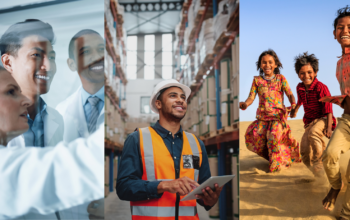Five Questions to …. Margaret Afriyie
This year’s theme for the International Women’s Day is “Each for Equal”. In an effort to showcase the crucial role women play in healthcare, we had the pleasure to speak with Margaret Afriyie, a midwife from Ghana, among others, about her efforts to empower women in rural communities to seek antenatal and postnatal care in safe settings.
Women play a vital role in the global healthcare workforce as nurses, midwives, community health workers and doctors. What determined you to pursue this field?
I live in the Ashanti Region in Ghana, one of the most populated regions of the country. The area I live in is a rural one, where most people rely on farming as a livelihood – I am a midwife and a farmer.. I am connected with the members of my community. I felt it was important for me to be involved in helping to educate the women in my community take better care of their health, give them advice about how to take care while they are pregnant, and discourage them from giving birth at home.
With the income that I make from farming, I conduct home visits and talk to future mothers about the importance of giving birth in safe conditions and encourage them to attend the clinic for proper antenatal and postnatal care. I explain that this keeps babies healthy but also avoids birth delivery complications, so they have a chance at recovering faster and returning to their usual activities in the community.

© Margaret Afriyie
You are based at Ahweram Community-Based Health Planning and Services (CHPS) Compound. How do you cope with being the only midwife at the station?
The facility takes care of residents from several communities. I am the midwife, but I do have support at the CHPS Compound from nurse assistants and other volunteers as well. Together, we handle 12 deliveries on average per month, which is already quite tough given our resources. We could handle maximum 15 in a month, but that would be extremely challenging.
We do try to plan. For instance, the advice I give to women is to get in touch with us when they see the first signs of pregnancy. This allows me to check up on them several times and guide them through the pregnancy. But sometimes even getting them in the clinic in the first place can be challenging, as distance and lack of roads or means of transportation discourages them from coming to see me. So, I work with a motorbike rider who takes me to see them or who brings them to the clinic, especially if they live in remote areas.
How do you empower the women in your community to come to you for advice?
Establishing a relationship with the mothers is essential. I do a lot of house visits. Beyond trying to educate them on the basics like how to give the baby a bath or about the baby’s umbilical cord, I try to use different methods to earn their trust and reward them for coming to the clinic for antenatal care. Using own funds, I give them tins of milk or bread to take home. When possible, after delivery, I send them home with some diapers or baby clothing. With the support of my mother, we set up the “Margaret Afriyie Mother and Child Community Initiative” to sustain this activity.
The fact is that if someone gets sick, they won’t attend the hospital because of the distance they have to travel. The introduction of CHPS in Ghana has helped a lot in rural areas and has resulted in more people accessing basic health services closer to home. When it comes to my profession, what I see are fewer complications for women giving birth. I see mothers knowing how to breastfeed, knowing about vaccines for their children.

© Margaret Afriyie
Maternal mortality reduction (MMR) remains a priority under the SDGs, with a target of a global MMR of fewer than 70 maternal deaths per 100,000 live births by 2030. Given this target, which measures do you believe Ghana can take to address the shortage of nurses and midwives in the country?
It’s a lot of work to educate mothers, women and girls about their health. But I think we’re getting there in terms of reducing maternal mortality rates, we’re spreading the message about the potential consequences of delivering at home.
It takes a lot of effort to go from door to door. But again, I’m confident this is paying off. This way, we’re able to identify high risk patients and refer them early to specialists and to reduce antepartum or postpartum complications.
So human capacity is an issue. Beyond allocating more resources for building the health system or educating and training healthcare workers, there’s an additional factor that needs to be considered: freshly graduated medical professionals will prefer to accept to be stationed in urban areas rather than come work in rural communities. That’s because of the lack of proper infrastructure in the area or even lack of electricity at the clinic. Measures to incentivize the development of rural areas are needed, or so that students are happy to accept a posting here.
To quote Kofi Annan, the late Ghanaian diplomat who served 10 years as UN Secretary General, “when women thrive, all of society benefits, and succeeding generations are given a better start in life”. Which measures can help address barriers that girls and women in Ghana face in accessing education and economic opportunities?
I think perceptions need to change – parents need to understand why it is important for girls to remain in school. You often hear families that rely on farming for livelihood tell girls “Why are you going to school? Come and help me”. This is something that I am trying to address by raising awareness of girl child education. When I go on my medical consultations or when I speak to children in school, I often give myself as an example. Would I be able to practice my profession without an education?
In a way, social media has a big role to play in changing this attitude. But passing laws on education could also help ensure girls stay longer in schools, especially in deprived areas.
Author





